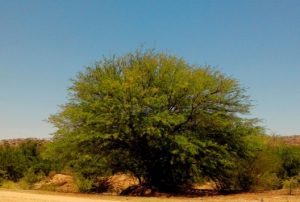
Decarbonisation is a vital component of Ethiopia’s efforts to battle climate change, promote sustainable development, and move to a greener economy. As a result, Ethiopia has made a strong commitment to decreasing carbon emissions through a variety of policies, initiatives, and programs.
Additionally, Ethiopia pledges to support efforts in a number of climate-related initiatives, including the restoration of degraded landscapes, the introduction of green industrialization routes, comprehensive agricultural practices that are climate resilient, and the introduction of electric vehicles and railways to promote green mobility.
Notwithstanding the nation’s endeavors to tackle climate change and curtail carbon emissions, there have been challenges that impact the nation’s biodiversity and ecosystem. For example, the invasive species Prosopis juliflora has been negatively affecting the country, particularly the Afar and Somalia regions, for more than 30 years.
This species is currently common in several areas of other regions, including Amhara and Oromia. Prosopis juliflora is an invasive alien species and an evergreen shrub that thrives in arid and semi-arid environments.
According to data from the Ministry of Industry, mesquite, or Prosopis juliflora, is a type of flowering plant that belongs to the Fabaceae family of legumes. Although it is indigenous to Central and South America’s dry and semi-arid regions, it has spread to many other parts of the world, especially Africa, the Indian subcontinent, and portions of the Middle East.
It is also noted for its invasive and fast-growing qualities. Prosopis juliflora grows swiftly and forms dense thickets that compete with native species for water, light, and nutrients. Furthermore, its reproductive potential is high. It produces a high quantity of seeds that can survive in the soil for several years, which helps it spread quickly. Furthermore, the species can affect the soil’s chemistry and structure, making it less favorable to local vegetation.

It affects ecosystems because its invasion can result in a loss of biodiversity by displacing local species and altering habitat structure. It is also known for its loss of biodiversity. The spread of Prosopis juliflora can cause the loss or extinction of native plant and animal species. In agricultural settings, its invasive growth can impede crop production by competing with water and nutrients. It affects the country’s water resources. The species can absorb large volumes of groundwater, reducing local water availability for other plants and humans.
Although Prosopis juliflora has some advantages (such as providing shade, fodder, and fuelwood), its invasive nature creates substantial ecological issues in many Ethiopian places. As a result, controlling the spread of Prosopis juliflora usually entails a combination of mechanical removal, chemical treatments (herbicides), and ecological restoration attempts to reintroduce native species. However, management might be difficult because of its adaptability and propensity to regenerate.
Taking these realities into account, the Ethiopian Ministry of Industry has been preparing a project, a pilot program, and working with different partners to implement some steps to mitigate the harmful effects of this situation. In this case, it is essential to inquire about the adverse effects of this species. What steps has Ethiopia taken to rectify the harm caused by this species? Was the goal of the pilot project successful?
Ethiopian Ministry of Industry Climate Change Sector Reform Performance Project Alternative Fuel Senior Expert Tibebu Mulatu said that Prosopis juliflora was brought to Ethiopia during the Derg regime in the late 1980s. It was brought in largely to stabilize the soil, provide fodder for livestock, and produce fuelwood. However, due to the absence of proper management, its introduction has resulted in considerable ecological and socioeconomic issues, with it becoming an invasive species in some parts of the country.
Because of its quick growth across rangelands, croplands, and forests, it has become a threat to pastoral and agropastoral livelihoods, with a clear impact on Ethiopia’s Afar and Somali regions. The latest invasion figures show that the species’ rapid spread has affected about 1.2-2 million hectares of land. He also mentioned that its annual expansion pace ranges from 20 to 50,000 hectares.
He also highlighted that while Prosopis juliflora has many advantages, including the ability to provide shade, feed animals, prevent soil degradation, be used in forestry and construction, the food business, medicine, and other applications like bioenergy and the cosmetics industry, it also has drawbacks. greater capacity for competition than native plants, decline and extinction of native species as a result of rapid and vigorous growth, alteration of ecosystems and landscapes with unknown ramifications for other areas of nature, toxic and lethal animal feed, loss of livelihood due to livestock loss, and so forth.
It also poses complications and has serious consequences, such as physical injuries that lead to illnesses and sometimes death, the encouragement of Malaria, the impact on infrastructure owing to punctures or overgrowth, water loss from large-scale infestations, a hiding spot for criminals and wild animals, and so on, he added.
To counteract these effects, the government, particularly the Ministry of Industry, created a project and prepared legal frameworks and strategies. The strategy’s goals include managing Prosopis, specifically preventing its spread to uninvaded areas, reclaiming and restoring invaded areas after Prosopis has been cleared and sustainably managed for productive use, and boosting biodiversity. Additionally, the strategy regulates and coordinates Prosopis management initiatives for harmony and complementarity.
More significantly, the Ministry is preparing a pilot program to test Prosopis juliflora as an alternative energy source for manufacturing industries, particularly the cement industry. It also aims to determine whether land cleared from Prosopis juliflora can be used for forestry, agriculture, and the regeneration of indigenous plants. Additionally, it aims to determine whether using Prosopis juliflora in cement industries can reduce CO2 emissions and improve employment and livelihood in the local community.
As a result, the pilot program produced significant results in terms of land clearing. It has been particularly successful in eradicating 1,701 hectares of Prosopis juliflora infestations. Invaded a productive area, and 950 hectares were de-rooted and farmed with various crops utilizing an irrigation system in both the Afar and Somali regions.
Furthermore, the pilot test proved that the cleared and de-rooted land may be utilized to grow a variety of crops, with no Prosopis juliflora growing in the farmed area. However, if the de-rooted area is not cultivated, Prosopis juliflora will spread rapidly in 3-6 months, Tibebu explained.
According to him, the pilot test has significant effects on the rate of coal substitution and the reduction of emissions. It was verified that 1.4 tons of biomass from Prosopis juliflora could replace 1 ton of coal without compromising the production process or cement quality. Additionally, the pilot biomass project has demonstrated that using biomass from Prosopis juliflora might potentially cut net CO2 emissions by 1.52 tons for every ton of coal that is replaced.
Furthermore, proper management of Prosopis juliflora has social, environmental, and economic consequences. For example, the community benefited from the pilot period by providing 15,400 tons of biomass. This helps to remove 10,266 tons of coal from the system, resulting in a reduction of 23,100 tons of CO2 emissions. It also provided over 300 temporary jobs in farming activities and had an impact on the community’s livelihood. It has also saved over 1.5 million USD in the country’s foreign currency, he added.
He confirmed that the outcomes of the test proved that coal may be replaced with Prosopis juliflora biomass without harming the process or quality of the cement output. Even at the Ethiopian National Cement Factory, Prosopis juliflora biomass enhanced plant production by 20%. If there is no biomass supply, productivity will drop by 20%.
It also demonstrated that Prosopis juliflora will invade regions suited for cultivation with diverse crops, fruits, and animal feeds once harvested. Positively impacting the community’s healthy livelihood and biodiversity. Therefore, the ministry and stakeholders should work together to ensure effective species management and control, thereby improving present results and conserving other local ecosystems and biodiversity. In this method, Prosopis juliflora’s fate can be turned into a blessing rather than a curse.
BY EPHREM ANDARGACHEW
THE ETHIOPIAN HERALD TUESDAY 10 JUNE 2025




